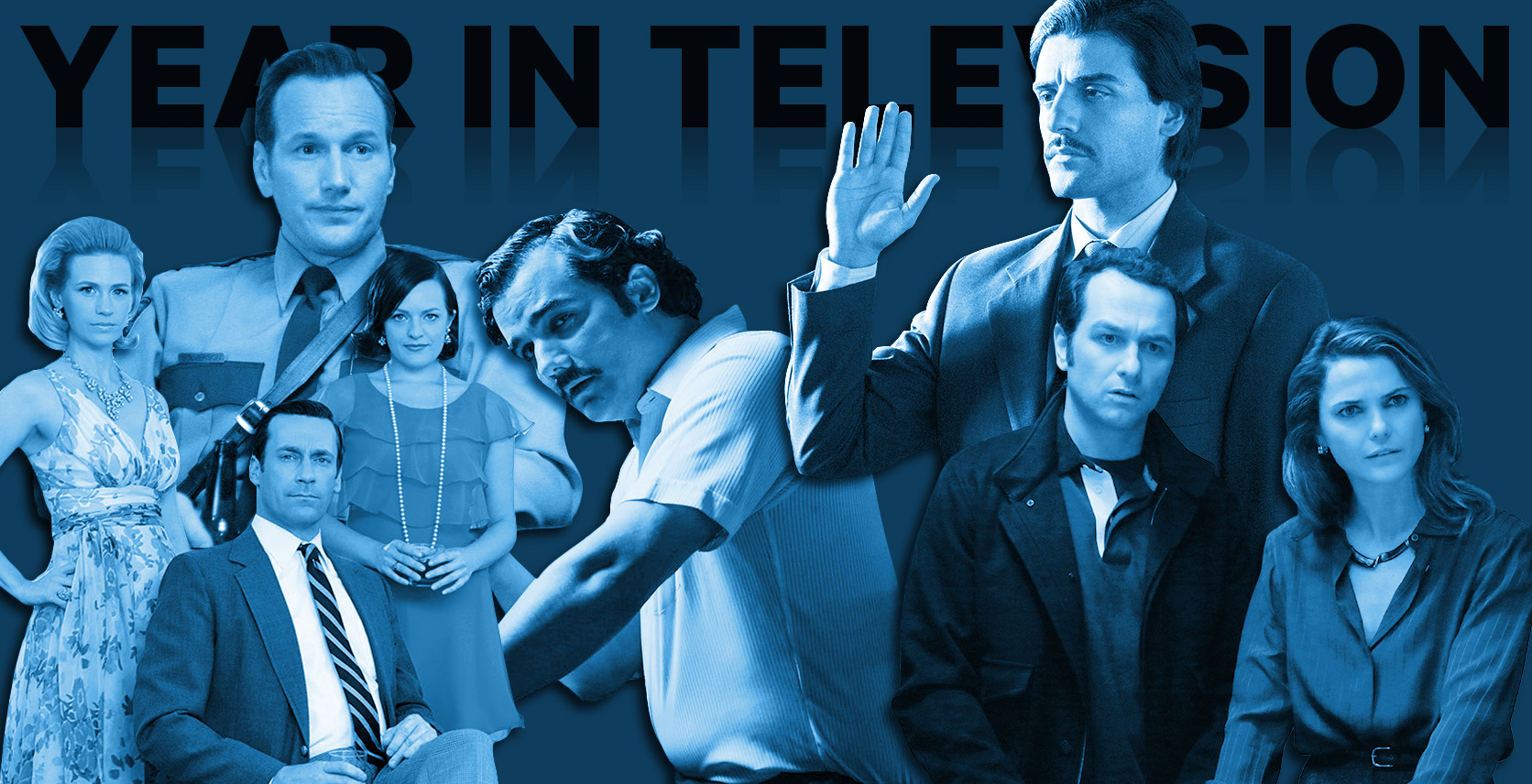The Year in Television: Mad Men, Narcos and the Shows We Loved in 2015
All week long, Sharp’s editors will be wrapping up 2015 by celebrating the very best of virtually everything that passed through our filters this year: the movies and shows we watched, the clothes we wore, the music we listened to and the gear we used.
Today, we recap all of the most moving dramas, side-splitting comedies, action-packed genre experiments and eccentric miniseries that aired on television in 2015.
Mad Men
It’s funny, in some ways, that Mad Men will be remembered as one of television’s last Golden Age shows. The prestige drama to end all prestige dramas. Yes, Matthew Weiner’s writing had all the depth and invention of a Raymond Carver story collection. Yes, Don Draper is an all-time great protagonist, an irresistible mess of self-doubt and discontent concealed beneath a shell of Brylcreem and worsted wool. And sure, the art direction and costuming and cinematography and musical selections were all tremendous. But when it comes down to it, the thing we all loved most about the show couldn’t have been less prestigious.
At its heart, Mad Men was a workplace sitcom. For all its existential ponderings, the show was built on a steady foundation of interoffice hijinks and quippy banter. No series has ever better captured the surrogate family that forms through the tedium and trauma of professional life. We tuned in week after week, year after year, not (only) because we wanted to watch Don go on another loathsome, relationship-imploding bender, but because we wanted to check back in with all our pals at the agency: Peggy and Stan, Roger and Joan, Pete and Kenny, even that odious scumbag Harry Crane. And that’s what’s made it so difficult to let go and accept that the show is over — because it feels, in some sense, like we’ve been let go.
— Yang-Yi Goh
Show Me A Hero
David Simon’s long awaited follow-up to The Wire (sorry, Treme, but you don’t really count) could not have come at a better time. The six-part HBO miniseries tells the story of Nick Wasicsko (Oscar Isaac in a career-defining role), the one-term mayor of Yonkers, New York during the city’s infamous and ill-fated attempts to desegregate public housing in the 1980s and ’90s.
Like The Wire, Simon’s storytelling focuses on the hyper real and hyper specific, plodding through the intricate details of local politics and lawsuits. But the amazing thing about Show Me A Hero is how those details serve to portray a set of larger themes that, sadly, keep recurring in Simon’s work: institutional racism, unimpeachable class divisions, the all-too-hard realities of being poor, black, Latino or otherwise in post-industrial America. Show Me A Hero premiered in August, at a time when much of the American political conversation focused on police brutality, racism, poverty, crime, and pervasive, divisive hate-fuelled fear — the same fear that, decades after this show was set, stubbornly refuses to go away.
— Peter Saltsman
Rick and Morty
This may garner nasty hate mail from fans of both South Park and BoJack Horseman, but here goes nothing: Rick and Morty is the best animated show on television right now. Heck, it’s one of the year’s best-written comedies, full stop. In its sophomore season, the sci-fi sitcom — created by Community mastermind Dan Harmon and Adventure Time voice actor Justin Roiland — became Adult Swim’s first original half-hour series to air in prime time, and for good reason. It’s equal parts hysterical and nerdy, centering on an alcoholic mad scientist (Rick) who brings his neurotic grandson (Morty) along for his inter-dimensional exploits. Sort of like a demented take on Doc Brown and Marty McFly, but with better comedic timing: rather than spew out polished punchlines, Roiland — who voices both Rick and Morty — litters his wickedly hilarious dialogue with stuttering, belching and improv.
But there’s more here: absurd slapstick, hints of meta-awareness, and intellectually rigorous sci-fi panoramas referencing the popular (The Twilight Zone) and obscure (Hyperion’s Tree of Pain). The show’s sci-fi format allows for boundless premises and possibilities, but this season, it boldly goes where no Adult Swim show has gone before: the heart. Rick’s cranky amorality, and Morty’s increasing protests at the trail of destruction they leave behind, eventually reach a boiling point, revealing a human side that’s been lurking beneath the jokes all along. It’s ambitious stuff for a silly cartoon.
— Alex Nino Gheciu
Broad City
I have not accidentally melted a neighbor’s dildo in the dishwasher in 2015 (or ever, I swear), nor have I gotten high on post-wisdom-teeth-extraction painkillers and run up a $1,500 tab at Whole Foods, egged on by a giant (hallucinated) stuffed animal. And yet, when people ask me what it’s like to be young, aimless, and vaguely broke in New York City, I’m often tempted to invoke Broad City, the web series turned Comedy Central sitcom that aired its greatly improved second season early this past year.
Broad City is a show about friendship, specifically between New York 20-somethings Abbi and Ilana (creators Abbi Jacobson and Ilana Glazer), but it prioritizes absurd, consistently LOL-worthy humor over likeability. In that, it stands apart from perfectly fine and very likeable NYC comedies like Friends and How I Met Your Mother, neither of which ever made me cry from laughing the way Broad City did at least twice this season. It’s a show for New Yorkers, and young people, who wouldn’t say no to true love but more immediately need a goddamn air conditioner that works. It’s vulgar, manic, defiantly unpredictable, and despite it all, pretty damn likeable—so, a lot like New York itself.
— Tim Kennedy
Master of None
When you only have Netflix and Shomi, the amount of new television that you can watch is limited. Shomi has started streaming new episodes of some shows as they air, but mostly you’re left behind during cultural conversations. You want to talk about the finale of Mad Men? I’ll let you know what I think of it next year.
Thank god for Master of None. The show took over the culture, riding a wave of innovative storytelling, progressive social issues, and solid laughs. And I got to watch it right when it dropped.
But, a best-of-the-year pick shouldn’t be about the one consuming the show, it should be about the quality of the show itself. Luckily, enough people have written about Master of None’s quality by now (including this very website) that I think I’m off the hook. It’s a wonderful ten episodes of television. The best of the year.
— Greg Hudson
Narcos
Will Netflix ever release a series that won’t be binge-until-you-forget-to-go-to-work good? Another notch on their nearly-worn-out belt this year was Narcos, a 10-part docudrama chronicling Pablo Escobar’s cocaine-fuelled rise to power and incomprehensible wealth. Brazilian actor Wagner Moura — who gained 40 pounds and learned to speak Spanish for the part — was mesmerizing as Escobar, so good that a small part of you rooted for the ruthless cartel kingpin to outsmart the DEA agents forever. Thankfully, the notorious drug lord escaped the first season relatively unscathed, and Netflix has already renewed the show for a second, so you can look forward to yet another accidental work-free week at some point in 2016.
— Bianca Teixeira
Fargo
If you’re like me, you balked at the thought of a TV show based on Fargo, the Coen brothers’ sleepy hit from 1996. But there it was on FX in 2014, folksy drawl in full-effect. With a thin connection to the original movie — a briefcase full of money being the sole intersection — the 10-episode limited series charged into the frozen landscape with Billy Bob Thornton leading the way in all his cracked glory. It was a remarkable, near-perfect season of television — a one-time miracle that could never be repeated. Or so we thought.
When FX announced Fargo would be returning for a second season, I balked all over again. And, once again, the show completed proved me wrong. Showrunner Noah Hawley avoided the usual sophomore slump trappings by telling a completely new story in a completely different era — namely, a hit-and-run gone awry circa 1979. Bolstered by strong performances from Kirsten Dunst, Ted Danson and Patrick Wilson, it takes advantage of the quirky Dakotas backdrop by injecting a healthy amount of kitsch amid all the intrigue. Once again, remarkable.
— Evan Sue-Ping
Mr. Robot
I was more than a little skeptical when I first heard about Mr. Robot. Here’s the pitch: A computer programmer working for a cybersecurity firm is recruited by a hacker collective hellbent on the destruction of an evil, monolithic corporation known as, um, Evil Corp. Throw in Christian Slater as the enigmatic Mr. Robot and a key primetime slot on the USA Network of all places, and, well, it didn’t exactly sound like the show of the summer.
The thing is, though, Mr. Robot is the real deal. A mix of Fight Club and The Girl With a Dragon Tattoo, Mr. Robot is a frenetic story of technology, paranoia and delusion that hits its mark at almost every opportunity. Buoyed by a standout lead performance by the relatively unknown Rami Malek, it’s further proof that you should never judge a book by its cover — or a television show by its title, network, stars and premise.
— Colin Rabyniuk
Transparent
In its second season, Transparent dives deeper into the lives of Maura Pfefferman, played by Jeffrey Tambor, and her three children as they adapt to life with a transgendered parent. While continuing to explore the struggles of trans men and women, the show also serves as an investigation into the blurred lines between selfishness and self-actualization, a motif told through the stories of the Pfefferman children. In many ways it’s a direct challenge to the progressive politics found in season one.
— Colin Rabyniuk










